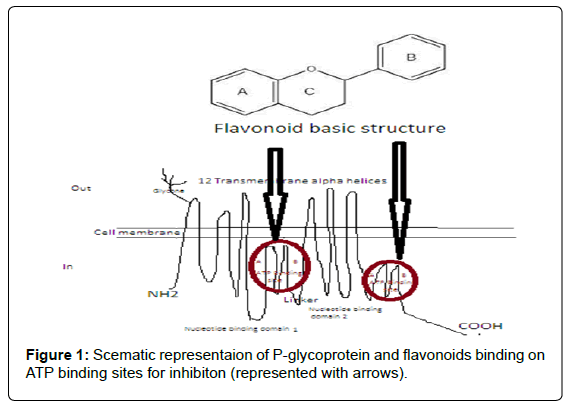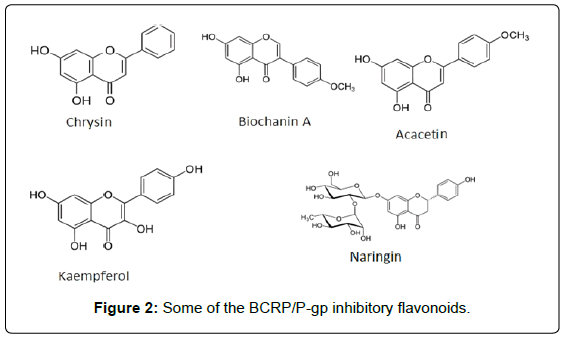Editorial Open Access
Bioactive Flavonoids as ABC Transporters Inhibitors for Reversion of Multidrug Resistance in Cancer
Nagendra Sastry Yarla1* and Ganapaty S21Department of Biochemistry and Bioinformatics, School of Life Sciences, GITAM Institute of Science, GITAM University, India
2Institute of Pharmacy, GITAM University, Visakhapatnam, India 530045
- *Corresponding Author:
- Nagendra Sastry Yarla
Department of Biochemistry and Bioinformatics
School of Life Sciences, GITAM Institute of Science
GITAM University, Visakhapatnam, India
Tel: +91 97016 08894
E-mail: sastryyn@gmail.com
Received date: December 26, 2013; Accepted date: December 27, 2013; Published date: December 31, 2013
Citation: Yarla NS, Ganapaty S (2013) Bioactive Flavonoids as ABC Transporters Inhibitors for Reversion of Multidrug Resistance in Cancer. J Marine Sci Res Dev 4: e123 doi: 10.4172/2155-9910.1000e123
Copyright: © 2013 Yarla NS, et al. This is an open-access article distributed under the terms of the Creative Commons Attribution License, which permits unrestricted use, distribution, and reproduction in any medium, provided the original author and source are credited.
Visit for more related articles at Journal of Marine Science: Research & Development
Drug resistance is a common clinical problem that occurs in patients suffering from infectious diseases and in patients suffering from cancer [1,2]. Multidrug resistance (MDR) is frequently associated with over expression of ABC transporters. This class of membrane proteins uses the energy of ATP hydrolysis to actively pump metabolites or xenobiotics out of cells against a concentration gradient. If members of this family are over expressed in chemotherapy-resistant tumor cells, they cause a remarkable decrease in cytoplasmic concentrations of chemotherapeutic agents. The ABC transporters that have been identified to play an important role in MDR are P-glycoprotein (P-gp, ABCB1), the breast cancer resistance protein (BCRP, ABCG2), and the multidrug-resistance-associated protein 1 (MRP1, ABCC1). A possible strategy to reverse ABC-transporter-mediated MDR is the inhibition of these proteins by inhibitors, also called modulators [2].
Plants and marine microorganisms are the best natural sources for identification of novel bioactive molecules. Flavonoids constitutes are the main group of polyphenolic compounds present in plants as well as marine bio source. More than 6500 of various flavonoids of plants have been reported to this date [3,4]. Flavonoids differ mainly by the structure of their ring C (oxidation status and substitution) and they are therefore classified into several subclasses such as flavones, isoflavones, flavanols, flavonols, flavonones, chalcones, etc. In the last 15 years, flavonoids, being non-toxic natural products, have attracted attention as ABC transporter inhibitors for the reversion of multidrug resistance in cancer (Table 1).
| Type of ABC transporter | Researcher, year | Inhibitors from natural sources |
|---|---|---|
| P-gp | ||
| Kitagawa et al., 2005 | Acacetin, Galangin, Myricetin, Morin, Biochanin A and Kaempferol6 | |
| Critchfieldet al., 1994 | Apigenin, Fisetin, Rutin7 | |
| Zhu et al., 2001 | Tea polyphenols8 | |
| BCRP inhibitors | ||
| Imai et al., 2004 | Phytoestrogens (Flavonoids)9 | |
| Ahmed-Belkacemet al., 2007 Shuzhonget al., 2004 | Bioeravinones G and H (two rotenoids) from Boerhaavia rotenoids10 Apigenin, Biochanin, Chrysin, Daidzein, Epigallocatechin (EGC), epigallocatechin-3-gallate (EGCG), Fisetin, Genistein, Hesperetin, Kaempferol, Luteolin, Morin, Myricetin, Naringenin, Naringin, Phloretin, Phloridzin, Quercetin, Silibin, Silymarin5 |
Table 1: BCRP/P-gp inhibitors from natural sources for the reversal of multidrug resistance in cancer.
ABC transporter commonly contains several hydrophobic transmembrane domains (TMDs) on the cell membrane. Membrane outside domain was glycosylated and two nucleotide binding domains 1 & 2 (NBDs) are internal of cell membrane. These TMDs form channels for substrate drugs. These NBD domains are participate in ATP binding and hydrolysis at ATP binding site. Some of the flavonoids bind in ATP binding site prevents ATP utilization leads to inhibition of ABC transporter efflux (Figure 1).
Flavonoids are the widely distributed naturalchemical constituents, which have been reporting as drug transporters inhibitors (Table 1). Apigenin, Biochanin, Chrysin, Daidzein, Epigallocatechin (EGC), epigallocatechin-3-gallate (EGCG), Fisetin, Genistein, Hesperetin, Kaempferol, Luteolin, Morin, Myricetin, Naringenin, Naringin, Phloretin, Phloridzin, Quercetin, Silibin, Silymarin are the different kind of flavonoids which are reported as BCRP inhibitors. Among those Chrysin and biochanin A are the most potent BCRP inhibitors, producing significant increases in mitoxantrone accumulation in BCRP over expressing cancer cell lines (Figure 2) [5].
Flavonoids have been subjected to various chemical modifications in order to obtain better P-glycoprotein inhibitors [5]. In general, it was found that modifications that increased hydrophobicity of the molecule such as prenylation or geranylation significantly increased the modulatory activity of flavonoids [6].
According to this observation, 8-prenylnaringenin turned out to be an effective inhibitor of rhodamine 123 transport in human adenocarcinoma cells [7]. Phytoestrogens are flavonoids with weak estrogenic activities, were reported as ABC transporter inhibitors [8,9].
Marine is also rich source of natural products including flavonoids. Marine bioactive flavonoids have been reporting for various biological activities [10-13]. Isorhamnetin 3-O-b-D-glucosides, and quercetin 3-O-b-D-glucoside were isolated from Salicornia herbacea [14]. Scutellarein 4’-methyl ether, a flavones isolated from a red alga Osmundea pinnatifida and reported its anticancer activities [15]. Luteolin 7-O-β-d-glucopyranosyl-2”-sulfate, a new flavone glycoside was isolated Thalassia testudinum leaf [16]. Thus marine natural products especially flavonoids have great scope in future discovery as ABC transporter inhibitory drugs for reversion of multidrug resistance in Cancer.
References
- Federico M, Kerstin S, Markus H, Michael W (2013) Synthesis and Quantitative Structure–Activity Relationships of Selective BCRP Inhibitors. Chem Med Chem 8: 125-135.
- Cheol-Hee C (2005) ABC transporters as multidrug resistance mechanisms and the development of chemosensitizers for their reversal. Cancer Cell International 5: 1-13.
- Scalbert A, Williamson G (2000) Dietary intake and bioavailability of polyphenols. J Nutr1 30: 2073S–2285S.
- Harborne JB, Williams CA (1992) Advances in flavonoid research since. Phytochemistry 55:481–504.
- Shuzhong Zhang, Xinning Yang, Marilyn EMorris (2004) Flavonoids Are Inhibitors of Breast Cancer Resistance Protein (ABCG2)-Mediated Transport. Mol Pharmacol 65:1208-1216.
- Kitagawa S, Nabekura T, Takahashi T, Nakamura Y, Sakamoto H, et al. (2005) Structure-activity relationships of the inhibitory effects of flavonoids on P-glycoprotein-mediated transport in KB-C2 cells. Biol Pharm Bull 28:2274–2278.
- Critchfield JW, Welsh CJ, Phang JM, Yeh GC (1994) Modulation of adriamycin accumulation and efflux by flavonoids in HCT-15 colon cells. Activation of P-glycoprotein as a putative mechanism. Biochem Pharmacol 48:1437–1445.
- Zhu A, Wang X, Guo Z (2001) Study of tea polyphenol as a reversal agent for carcinoma cell lines' multidrug resistance (study of TP as a MDR reversal agent). Nucl Med Biol 28: 735-740.
- Imai Y, Tsukahara S, Asada S, Sugimoto Y (2004) Phytoestrogens/Flavonoids Reverse Breast Cancer Resistance Protein/ABCG2-Mediated Multidrug Resistance. Cancer Res 64: 4346-4352.
- Chang-Suk Kong, You Ah Kim, Moon-Moo Kim, Jin-Sook Park, Jung-Ae Kim, et al. (2008) Flavonoid glycosides isolated from Salicorniaherbaceainhibit matrix metalloproteinase in HT1080 cells. Toxicol in Vitro 22: 1742-1748.
- JB HARBORNE (ED.) The flavonoids–Advances in research since 1986 Chapman & Hall, London, UK, 1994, 117.
- Li, Ren-wei He, Jian-dong Xu, Qing Wu, Dong-mei (2012) Study on anti-oxidative activities of flavones extract from sea Asparagus. Journal of Anhui Agricultural Sciences. 40: 13989-13992.
- KR Markham, LJ Porter (1969) Flavonoids in the green algae (chlorophyta). Phytochemistry 8: 1777-1781.
- Chen Zhang, Se-Kwon Kim (2009) Matrix Metalloproteinase Inhibitors (MMPIs) from Marine Natural Products: the Current Situation and Future Prospects. Mar Drugs 7: 71-84.
- Sabina H, Aliya R (2009) Seaweed as a new source of flavone, scutellarein 4'-methyl ether. Pak J Bot 41: 1927-1930.
- Jensen PR, Jenkins KM, Porter D, Fenical W (1998) Evidence that a New Antibiotic Flavone Glycoside Chemically Defends the Sea Grass Thalassiatestudinum against Zoosporic Fungi. Appl Environ Microbiol 64: 1490-1496.
Relevant Topics
- Algal Blooms
- Blue Carbon Sequestration
- Brackish Water
- Catfish
- Coral Bleaching
- Coral Reefs
- Deep Sea Fish
- Deep Sea Mining
- Ichthyoplankton
- Mangrove Ecosystem
- Marine Engineering
- Marine Fisheries
- Marine Mammal Research
- Marine Microbiome Analysis
- Marine Pollution
- Marine Reptiles
- Marine Science
- Ocean Currents
- Photoendosymbiosis
- Reef Biology
- Sea Food
- Sea Grass
- Sea Transportation
- Seaweed
Recommended Journals
Article Tools
Article Usage
- Total views: 14981
- [From(publication date):
February-2014 - Mar 31, 2025] - Breakdown by view type
- HTML page views : 10341
- PDF downloads : 4640


